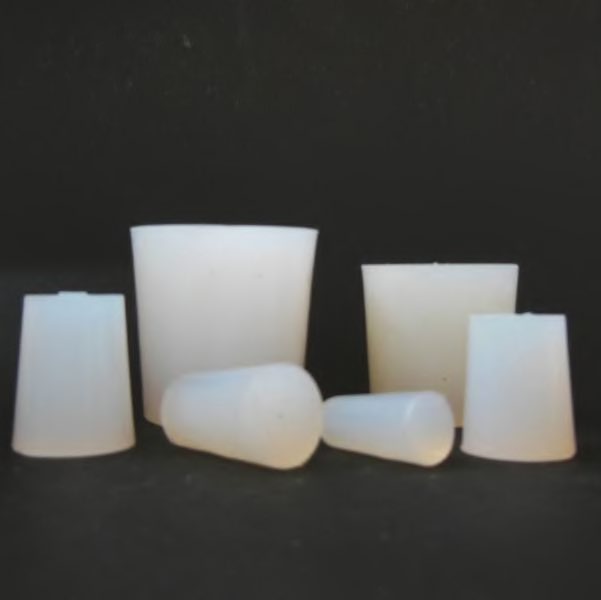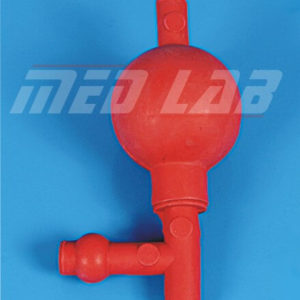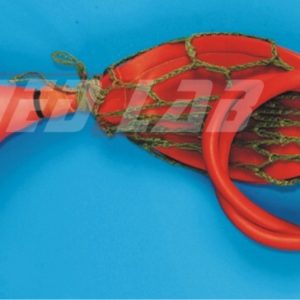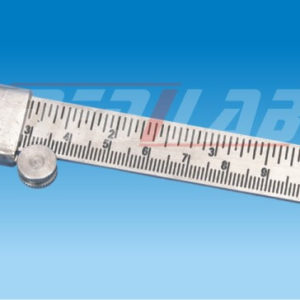Description
| Catalog No. | Cork Number | om | Top | Height |
| (in MM) | (in MM) | (in MM) | ||
| ±.2mm | ±.2mm | ±.2mm | ||
| 19816/1 | 5 | 5 | ||
| 19816/2 | 8 | 8 | 10.5 | 20 |
| 19816/3 | 9 | 9 | 11.5 | 20 |
| 19816/4 | 10 | 10 | 12.5 | 20 |
| 19816/5 | 11 | 11 | 14 | 24 |
| 19816/6 | 13 | 13 | 16 | 24 |
| 19816/7 | 15 | 15 | 18 | 24 |
| 19816/8 | 17 | 17 | 20.5 | 26 |
| 19816/9 | 18 | 18 | 21 | 26 |
| 19816/10 | 19 | 19 | 22.5 | 28 |
| 19816/11 | 21 | 21 | 24.5 | 28 |
| 19816/12 | 23 | 23 | 26.5 | 28 |
| 19816/13 | 25 | 25 | 28.5 | 28 |
| 19816/14 | 27 | 27 | 31 | 32 |
| 19816/15 | 29 | 29 | 31 | 32 |
| 19816/16 | 31 | 31 | 36 | 35 |
| 19816/17 | 33 | 33 | 38.5 | 38.5 |
| 19816/18 | 35 | 35 | 45.5 | 36.5 |
| 19816/19 | 38 | 38 | 42.5 | 40.5 |
| 19816/20 | 40 | 40 | 49.5 | 40.5 |
Silicone Rubber Corks are high-performance tapered stoppers designed to provide secure, leak-free sealing of laboratory glassware, including test tubes, beakers, flasks, and reaction vessels. Manufactured from premium silicone rubber, they withstand extreme temperatures and continuous exposure to laboratory chemicals. Their durability and stability make them essential components for reliable sealing in research, industrial, and analytical environments.
Key Features
- Made from high-purity silicone rubber for excellent sealing performance
- Resistant to acids, alkalis, solvents, and harsh laboratory chemicals
- High thermal stability for use in heating, cooling, and autoclaving processes
- Flexible yet strong, retains shape without cracking or hardening over time
- Non-reactive, non-toxic, and ideal for sensitive chemical and biological workflows
- Smooth tapered design ensures a tight, consistent fit across compatible glassware
- Available in multiple sizes for universal laboratory application
- Long service life even under frequent sterilisation cycles
Material Specifications
- Material: Laboratory-grade silicone rubber
- Thermal Properties: Suitable for extreme temperature applications; safe for autoclaving
- Chemical Resistance: High resistance to acids, alkalis, organic solvents, and reagents
- Mechanical Strength: Excellent elasticity, compression recovery, and deformation resistance
- Standards: Manufactured according to standard laboratory rubberware guidelines (ISO/DIN compliant)
Technical Specifications
- Available Sizes: Wide range of stopper sizes to fit most lab glassware (as per the standard size table)
- Design: Tapered cylindrical body for strong sealing; optional solid or bored versions
- Tolerance: Standard moulded stopper tolerances ensuring a reliable and consistent fit
- Accessories Included: None required; compatible with standard laboratory glassware
Handling & Precautions
- Clean with mild detergents or laboratory-grade cleaning solutions; avoid prolonged exposure to aggressive solvents
- Autoclavable to ensure temperature settings fall within manufacturer safety limits
- Avoid direct flames or overheating beyond the rated thermal capacity
- Store in cool, dry conditions away from direct sunlight to prevent material ageing.
- Inspect periodically for wear, cracks, or deformation, and replace when necessary
- Select the proper stopper size to maintain airtight sealing and avoid glassware stress
Applications
- Suitable for chemical laboratories, microbiology labs, pharmaceutical R&D, QC/QA facilities, and analytical labs
- Ideal for sealing test tubes, beakers, flasks, culture vessels, filtration containers, and reaction apparatus
- Used in heating, cooling, storage, and sample preparation workflows
- Perfect for environments requiring chemical resistance, thermal stability, and non-reactive sealing
- Widely used in academic research institutions, biotech companies, chemical industries, and quality laboratories







